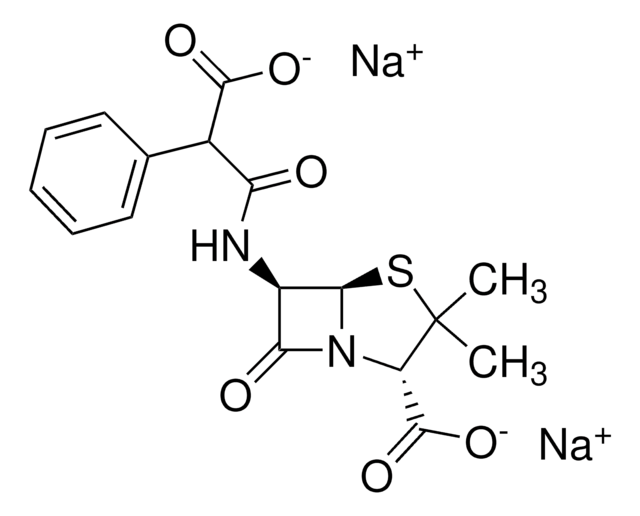C1613
Carbenicillin
Ready Made Solution, 100 mg/mL in ethanol/water, 0.2 μm filtered
Synonym(s):
α-Carboxybenzylpenicillin solution
About This Item
Recommended Products
Quality Level
sterility
0.2 μm filtered
form
liquid
concentration
100 mg/mL in ethanol/water
solubility
H2O: 100 mg/mL
ethanol: 100 mg/mL
suitability
suitable for testing specifications (Bacteriostatic (cell type) E. Coli DH5a, result: pass)
antibiotic activity spectrum
Gram-negative bacteria
Gram-positive bacteria
Mode of action
cell wall synthesis | interferes
shipped in
wet ice
storage temp.
−20°C
SMILES string
CC1(C)S[C@@H]2[C@H](NC(=O)C(C(O)=O)c3ccccc3)C(=O)N2[C@H]1C(O)=O
InChI
1S/C17H18N2O6S/c1-17(2)11(16(24)25)19-13(21)10(14(19)26-17)18-12(20)9(15(22)23)8-6-4-3-5-7-8/h3-7,9-11,14H,1-2H3,(H,18,20)(H,22,23)(H,24,25)/t9?,10-,11+,14-/m1/s1
InChI key
FPPNZSSZRUTDAP-UWFZAAFLSA-N
Looking for similar products? Visit Product Comparison Guide
General description
Application
Biochem/physiol Actions
Other Notes
Signal Word
Danger
Hazard Statements
Precautionary Statements
Hazard Classifications
Flam. Liq. 3 - Resp. Sens. 1 - Skin Sens. 1
Storage Class Code
3 - Flammable liquids
WGK
WGK 2
Flash Point(F)
104.0 °F - closed cup
Flash Point(C)
40 °C - closed cup
Personal Protective Equipment
Choose from one of the most recent versions:
Already Own This Product?
Find documentation for the products that you have recently purchased in the Document Library.
Customers Also Viewed
Our team of scientists has experience in all areas of research including Life Science, Material Science, Chemical Synthesis, Chromatography, Analytical and many others.
Contact Technical Service







